Between species and sexes: the genetic basis of adaptive traits in African cichlid fishes
Main Speaker: Emily Moore
Assistant Professor , University of Nebraska-Lincoln | School of Biological Sciences
Date: 9/3/2025
Time: 3:30 PM
Location: 107 South Hardin Hall (Auditorium)
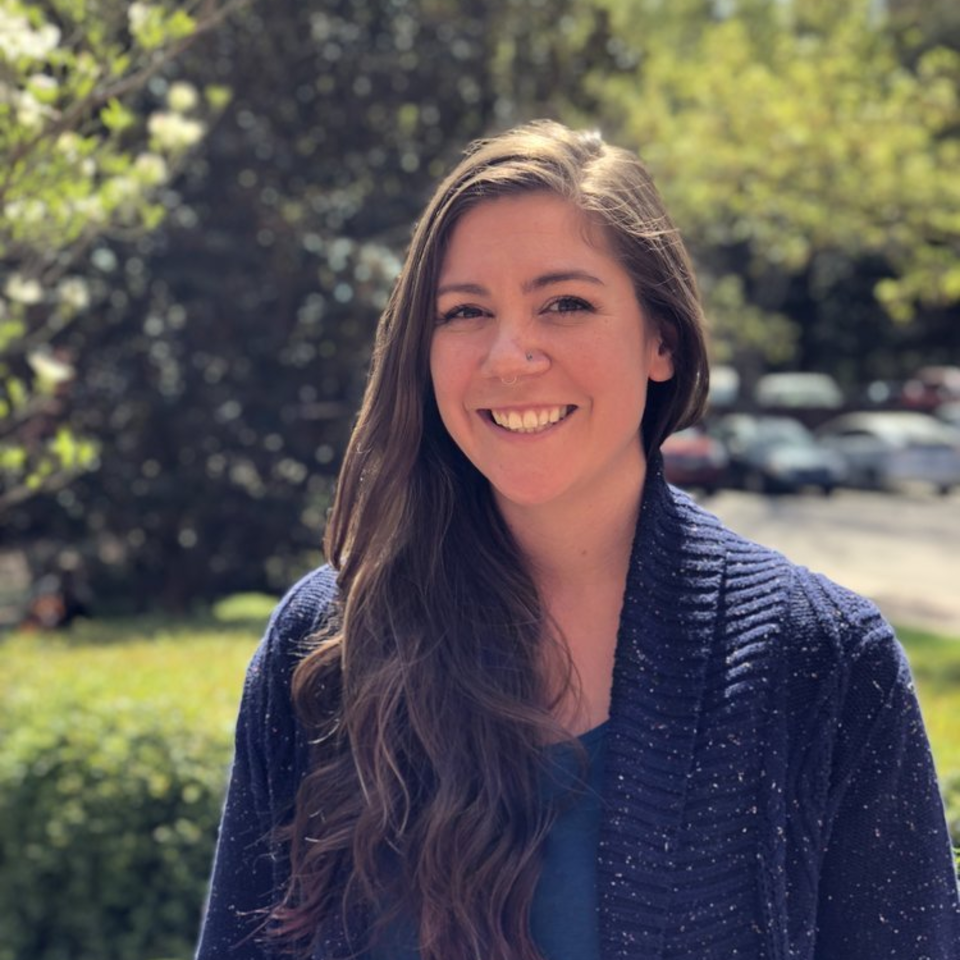
Abstract
The cichlid fishes of East Africa are an astounding “natural experiment” in adaptive evolution. The group rapidly diversified, with striking variation in functional traits such as jaw and body morphology, cryptic pigmentation, and exploratory behavior. My work examines the genetic basis of adaptive traits in the group, combining phenotyping, comparative genomics, and classical genetics to link genotype to phenotype to fitness. This talk will present work on the role of complex sex chromosome systems in shaping trait variation, as well as the functional genomic basis of variation in niche partitioning exploratory behaviors.Speaker's Bio
Emily has a BS and a BA from the University of Colorado, Denver; MS from Colorado State University, and a PhD with Reade Roberts at North Carolina State. Postdoc at the University of Montana with Jeff Good and University of Denver with Erica Larson. https://biosci.unl.edu/person/emily-moore/Speaker's Contact Information
- emoore28@unl.edu
Video
Wilder Weather: Research, Communication, and Connection
Main Speaker: Barb Boustead
Climatologist | Meteorologist | Instructor | Writer
Date: 9/10/2025
Time: 3:30 PM
Location: 107 South Hardin Hall (Auditorium)
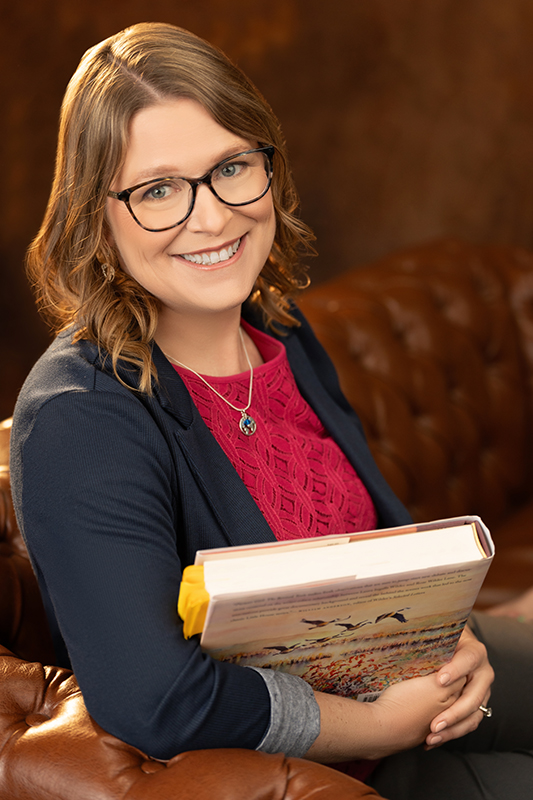
Abstract
Laura Ingalls Wilder wasn’t an official weather observer. She simply paid attention. Her life and livelihood intertwined with the weather and climate around her, inseparable. Barb’s research revealed the accuracy of the vivid, detailed weather descriptions in her fictional Little House books—stories of blizzards and prairie fires, tornadoes and grasshoppers, floods and droughts. Wilder’s trusted voice builds a bridge for the millions of Americans who have enjoyed her books to connect the weather of the past to weather today and in the future, shining light on the changing climate around us and the ways to keep our families and communities safe.Speaker's Bio
Dr. Barbara Boustead is a meteorologist, climatologist, and author of Wilder Weather: What Laura Ingalls Wilder Teaches Us About Weather, Climate, and Protecting What We Cherish. A career meteorologist and climatologist as well as a Wilder scholar, she has expertise in weather and climate communication, connections between climate and extreme weather, and weather and climate data analysis. Barb earned bachelor's degrees from Central Michigan University in meteorology, geography, and English, a master's degree in meteorology from Penn State University, and a Ph.D. in Natural Resources: Climate Assessment and Impacts from the University of Nebraska-Lincoln. Originally from Michigan, Barb lives in Gretna, Nebraska, with her husband and son.Video
Understanding and Assessing Climate Change: Preparing for Nebraska's Future
Main Speaker: Nebraska State Climate Office and Department of Earth and Atmospheric Sciences
Date: 9/17/2025
Time: 3:30 PM
Location: 107 South Hardin Hall (Auditorium)
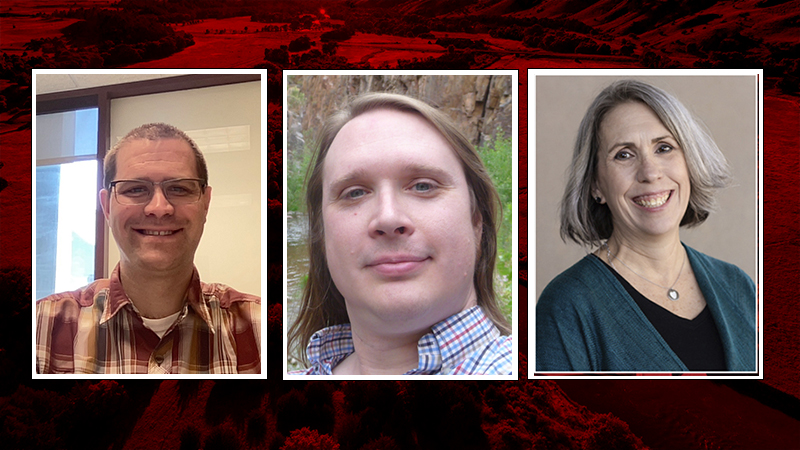
Abstract
Climate change is no longer a distant threat—it is reshaping Nebraska today. Warmer temperatures, shifting rainfall, and more extreme weather are disrupting agriculture, water supplies, energy, ecosystems, and community well-being across the state. These challenges also bring opportunities to strengthen resilience and build a more sustainable future. This seminar discusses the state of Nebraska’s recent climate change impact assessment, highlighting the latest science on Nebraska’s changing climate and emphasizing the urgency of reducing risks, adapting to changes, and building a sustainable future for all Nebraskans.Speaker's Bio
Deborah Bathke is the Nebraska State Climatologist and an Associate Professor in the School of Natural Resources. She was a climatologist with the National Drought Mitigation Center for 16 years, and during that time, she authored the U.S. Drought Monitor, served as the coordinator for the center’s education and engagement activities, and worked to develop decision-support tools for drought risk management. In addition, Dr. Bathke was the lead author of the state’s 2014 climate change impact assessment, Understanding and Assessing Climate Change: Implications for Nebraska. Dr. Bathke is a native Nebraskan and grew up in Ponca. She earned her BS and MS from the University of Nebraska–Lincoln and a PhD in Atmospheric Sciences from The Ohio State University.
Eric Hunt is an Assistant Extension Educator of Agricultural Meteorology and Climate Resilience for the University of Nebraska–Lincoln Extension. He is based in the Nebraska State Climate Office and the School of Natural Resources. Dr. Hunt provides routine weather and climate updates for the agricultural community across the state. He received his PhD in Natural Resource Sciences with a specialization in Bio-Atmospheric Interactions from the University of Nebraska–Lincoln.
Ross Dixon is an Assistant Professor in the Department of Earth & Atmospheric Sciences at the University of Nebraska–Lincoln. His research is focused on climate modeling, regional climate dynamics, and precipitation projections. Dr. Dixon joined UNL in 2021 after obtaining a PhD from the University of Wisconsin–Madison, followed by postdoctoral positions at the Centre National de Recherches Météorologiques in Toulouse, France, and the University of Arizona. He has worked on various projects that focused on understanding uncertainty in projections of West African climate. He has recently been involved with research on rain-on snow events across the central United States. To further this research, he regularly designs and runs simulations with a wide range of complexities and applies statistical techniques to model output and observations.
Video
Ecology and Homicide
Main Speaker: Leon Higley
Professor of Applied Ecology , University of Nebraska-Lincoln | School of Natural Resources
Date: 9/24/2025
Time: 3:30 PM
Location: 107 South Hardin Hall (Auditorium)
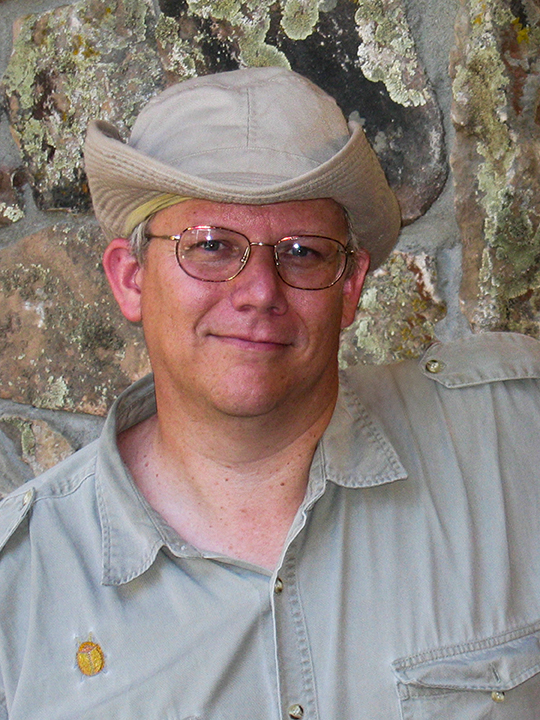
Abstract
A dead animal represents a unique transient resource from an ecological standpoint. Understanding this ecology has led to its use in forensic settings involving animals and humans. In this seminar we will consider an actual homicide and how features of its ecology led to information on the crime. Along the way we will look at research issues my students and I have addressed over the past 20 years in establishing estimates for determining the time of death.Speaker's Bio
Leon G. Higley is a Professor of Applied Ecology and Forensic Science at the University of Nebraska-Lincoln. He has a BA in chemistry from Cornell University and an MS in entomology and PhD in entomology and crop physiology from Iowa State University. His research areas include forensic entomology, thermal biology of tiger beetles, plant physiological responses to insect injury (particularly photosynthesis), pest management decision making, and other issues in ecophysiology. Departmental ProfileSpeaker's Contact Information
- lhigley1@unl.edu
Video
Lewis and Clark and the Geology of the Great Plains in Nebraska and Adjacent States, 1804-1806
Main Speaker: Robert Diffendal
Emeritus Research Geologist , University of Nebraska-Lincoln | Conservation and Survey Division
Other Speakers: Anne Diffendal
Date: 10/1/2025
Time: 3:30 PM
Location: 107 South Hardin Hall (Auditorium)
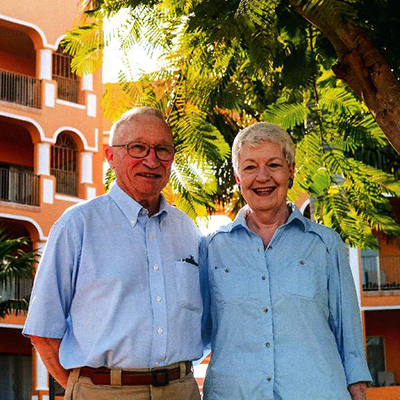
Abstract
In 1804 Meriwether Lewis and Willima Clark started on their journey up the Missouri River to explore the piece of land known as the Louisiana Purchase. President Thomas Jefferson charged Lewis to follow the Missouri River to its headwaters and then locate rivers down the west side of the Rocky Mountains to the Columbia River and into the Pacific Ocean. Jefferson's written instructions further specified that the members of the expedition collect and describe plants and animals new to science; enter the latitudes and longitudes of the rivers, mountains, and other features; and note the land's potential for farming, as well as the climate, timber, and wildlife. They were also to record the occurrences of volcanic features and minerals of all kinds, but especially metals, limestone, coal, and saline and mineral waters. Their notebooks, journals, and maps prove that they did these things.
Supplemental Materials
Lewis and Clark and the Geology of the Great Plains
Lewis and Clark and the Geology of Nebraska and Parts of Adjacent States
Speaker's Bio
Robert F. Diffendal, Jr. graduated with a degree in geology from Franklin and Marshall College in Lancaster, Pennsylvania. He pursued graduate work at the University of Nebraska-Lincoln and received his MS and Ph.D. degrees there with a major in geology. He went on to teach geology, geography, and biology at St. Dominic College in Illinois and at Doane University.
He joined the faculty of UN-L in 1980 as a member of the Conservation and Survey Division, that is, the State Geological Survey, where he worked as a research geologist and held the rank of professor until his retirement in 2003. He is now Professor Emeritus in this division, a part of the UN-L School of Natural Resources. He has produced more than 300 articles, maps, guidebooks and other works on the geology of Nebraska and several articles on the geomorphic development of Yellow Mountain in China. He was the first Assistant Director of the School of Natural Resources (1997-2000).
Anne P. Diffendal graduated with a degree in history from Barry University in Miami, Florida. She went on to earn her MA degree from Emory University and her doctorate from the University of Nebraska-Lincoln in American History.
She has extensive experience in consulting on the planning, development and assessment of archival programs and interpretive historical exhibits for numerous museums, universities, foundations, historical societies, and corporations. She has contributed articles and book reviews to many publications. She served as the executive Director of the Society of American Archivists in Chicago and was the Manuscripts Curator of the Nebraska State Historical Society for more than a decade.
Speaker's Contact Information
- rdiffendal1@unl.edu
Video
Of Mice and Messaging: Bridging Restoration Ecology and Science Communication Education to Enhance Conservation
Main Speaker: Erin Rowland-Schaefer
Assistant Professor of Biology , University of Nebraska-Omaha
Date: 10/8/2025
Time: 3:30 PM
Location: 107 South Hardin Hall (Auditorium)

Abstract
In order for conservation efforts to succeed, buy-in from the local community is critical. However, undergraduate biology students rarely receive training in effective science communication practices, leading to future scientists prepared to conduct impactful research, but not well-equipped to share their work with the public. This talk will present a vision for the future of conservation research and education, highlighting the complementary nature of applied ecology research and science communication, through a presentation of the results of two studies. First, a long-term small mammal trapping project in a restored tallgrass prairie system identifies the species-specific impacts of land management and landscape on small mammals like mice and voles. Second, a survey study of undergraduate biology students in the southeast identifies opportunities and challenges in preparing students to be effective science communicators.
Referenced Paper: Learning the Landscape: An Active and Applied Lesson on Landscape Ecology for General Ecology Courses
Speaker's Bio
Erin G. Rowland-Schaefer is an ecologist and biology education researcher at the University of Nebraska at Omaha. Her work braids together traditional restoration ecology work, focusing on the impacts of landscape management on small mammal communities in tallgrass prairies, with work in equipping and preparing the next generation of scientists and conservation leaders. Her education work focuses on developing and evaluating teaching practices to support the development of science communication skills in biology courses, with a particular interest in preparing land managers and conservation scientists to have productive conversations with land owners and community stakeholders.
Dr. Rowland-Schaefer received her B.S. in Biology from Concordia University, Nebraska in Seward, NE and her Ph.D. from Northern Illinois University. She first fell in love with the prairies on the outskirts of Lincoln during her Midwest Flora class in college, setting her on the course to her current research path. In 2024, she received a National Science Foundation STEM Education Individual Postdoctoral Research Fellowship to study the use of socioscientific issues and science communication training in non-majors biology courses at Middle Tennessee State University.
Speaker's Contact Information
- erinschaefer@unomaha.edu
Video
Amplifying Ecohydrological Discovery using Ground-based Time-lapse Imagery
Main Speaker: Troy Gilmore
Groundwater Hydrologist , University of Nebraska-Lincoln | Conservation and Survey Division
Date: 10/29/2025
Time: 3:30 PM
Location: 107 South Hardin Hall (Auditorium)
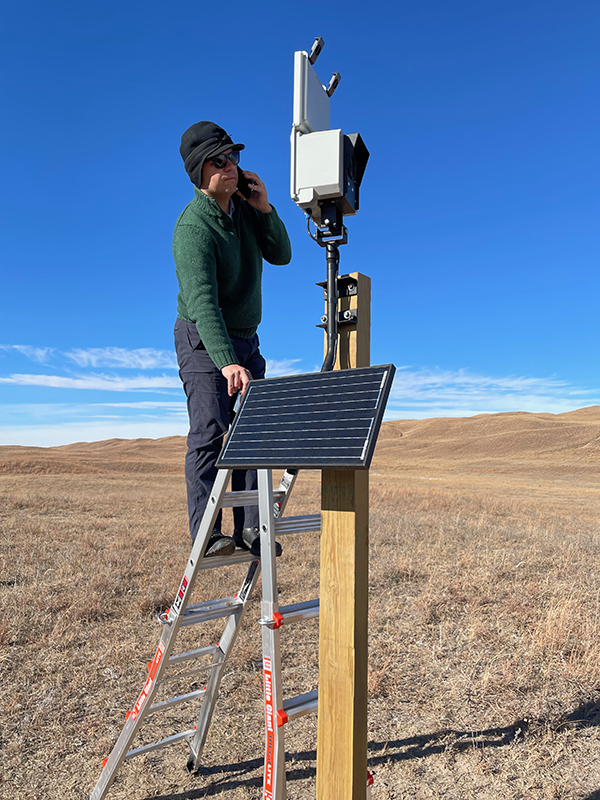
Abstract
Ground-based time-lapse imagery offers rich but underutilized data for ecohydrological research, education and communication. GRIME (GaugeCam Remote Image Manager Educational) is free, open-source software designed to streamline the use of such imagery by automating workflows from data retrieval to visualization, modeling and measurement. GRIME2 focuses on measuring water levels using specialized time-lapse imagery. GRIME AI (GRIME Artificial Intelligence) provides streamlined access to imagery and associated data from major public camera networks, including the USGS Hydrologic Imagery Visualization and Information System (HIVIS) and the PhenoCam network. GRIME AI capabilities include image quality assessment, annotation, instance segmentation, and extraction of image features such as color and texture. These tools are also compatible with imagery from individual trail cameras and other imagery datasets such as the watershed-scale Platte Basin Timelapse project. At the Kearney Outdoor Learning Area (KOLA) in Kearney, Nebraska, GRIME-AI and GRIME2 have supported a variety of student projects focused on ecohydrological dynamics. Future projects will be supported by automated analysis of imagery for the KOLA Data Dashboard (https://go.unl.edu/kdata), demonstrating the potential for supporting communication, education and scientific exploration at KOLA and other sites.Speaker's Bio
Troy Gilmore was raised in rural Ohio, moved to North Carolina as an adult, and earned his PhD in Biological and Agricultural Engineering at North Carolina State University. Currently an Associate Professor in the Conservation and Survey Division within the School of Natural Resources and in the Biological Systems Engineering Department at the University of Nebraska – Lincoln, Troy has published research on groundwater and surface water at sites across the United States and internationally. Always interested in finding new ways to observe water, Troy, students and collaborators in the GRIME Lab develop software that enables the use of ground-based time-lapse imagery (trail camera imagery) of water for science, communication and education.
Speaker's Contact Information
- gilmore@unl.edu
Video
The Three C’s: Content, Communication, and Community Engagement – Amplifying Research to Inform Decision-Making
Main Speaker: Crystal Powers
Extension Educator for Water and Cropping Systems , University of Nebraska-Lincoln | School of Natural Resources
Other Speakers: Becky Schuerman and Anni Poetzl
Date: 11/12/2025
Time: 3:30 PM
Location: 107 South Hardin Hall (Auditorium)
Abstract
The three pillars of Nebraska Extension are: strengthening Nebraska agriculture and food systems, inspiring Nebraskans and their communities, and enhancing the health and wellbeing of all Nebraskans. To drive these pillars forward, the Extension team works together with faculty and staff to amplify their findings on-the-ground, educate and engage stakeholders in best practices, and bring back questions and concerns from the community members across the state. This seminar will include an overview of Extension and its organizational structure, and then dive into how each speaker – Crystal Powers, Becky Schuerman, and Anni Poetzl – work within the Extension network.

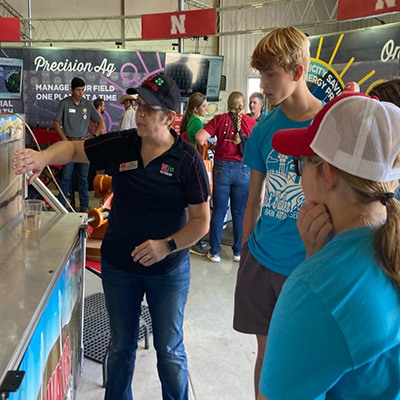

Speaker's Bio
Crystal A. Powers, Statewide Water Management Extension Educator, Water and Cropping Systems Extension Program Area Leader. Based at SNR, Nebraska Water Center, and Daugherty Water for Food Global Institute
Crystal's role is to build connections with research and extension faculty throughout the University of Nebraska system. Based in Lincoln, she works statewide for the Nebraska Water Center, Nebraska Extension, and the Daugherty Water for Food Institute, building partnerships with Nebraska's water professionals. Her Extension role is also Program Area Lead for the Water and Cropping Systems team, providing coordination and coaching in their mission to strengthen Nebraska agriculture and food systems while enhancing the health and well being of all Nebraskans. Her expertise is in systems analysis and science communication. She has a M.S. in Biological and Environmental Engineering from Cornell University and a B.S. in Biological Systems Engineering from UNL with a minor in science communication. Along with her two boys, Aiden and Liam, and husband William, they love youth music, sports, and 4-H with our menagerie of pets and city chicks(ens). She grew up a Husker in rural Nuckolls and Thayer counties.
Becky Schuerman, Statewide Nebraska Extension Associate, Domestic Water/Wastewater Management
Becky is a Statewide University of Nebraska Extension Associate overseeing the Domestic Water/Wastewater Program. She holds a bachelor's degree in Agriculture and Natural Resources and is currently pursuing a master's degree in Natural Resources with a focus on Human Dimensions. In her role, Becky develops and delivers resources to private well and onsite septic system owners, helping them manage their water and wastewater systems to best protect both public health and the environment. Additionally, she coordinates educational programs on water quality and quantity for all ages across Nebraska. Becky works closely with a variety of state, local, university, and industry partners to offer continuing education for water, wastewater, environmental, public health, and other professionals.
Anni Poetzl, Statewide Water Quality Extension Educator; Liaison with the Department of Water, Energy, and Environment (DWEE)
Anni joined the UNL Extension team March 2025 as the water quality extension educator. She works to connect resources and information between UNL research faculty, DWEE staff, and the public members she interacts with at manifold events, while also providing outreach and educational support for water quality projects across the state. Anni graduated with her bachelor's degrees in English (Literature) and Biological Sciences (Conservation Biology and Ecology) from Arizona State University, and her master’s degree from UNL in Natural Resources.
Speaker's Contact Information
- cpowers2@unl.edu
Video
Book Release: "The Best of Intentions: a story of landscape change in the heart of the Great Plains"
Main Speaker: Larkin Powell
Director of the School of Natural Resources , University of Nebraska-Lincoln | School of Natural Resources
Date: 1/23/2026
Time: 3:30 PM
Location: 107 South Hardin Hall (Auditorium)

Abstract
It is no surprise that Nebraska—at the heart of the Great Plains—has long served as a canvas for sweeping transformation. Once a prairie teeming with bison and Native maize, it has become a landscape of center pivot irrigation, herds of cattle, and hybrid corn. How did these changes happen so quickly? And who were the people, policies, and pressures that synchronized new uses of the land? Taking themes from his new book, The Best of Intentions, Powell explores the forces that have reshaped the Plains—our ethics that impact our decisions, the 'conductors' that cause landscape transformations to occur quickly, and our ability to shape the landscape through environmental design. Drawing on decades of research, Powell blends historical photographs, personal narratives, and long-term ecological data to ask how the past might guide us toward a more resilient future.Speaker's Bio
Departmental WebpageSpeaker's Contact Information
- lpowell3@unl.edu
Video
Quantifying carbon sequestration from an enhanced rock weathering application at an agricultural field in Nebraska
Main Speaker: Kalley Collins
PhD candidate , School of Natural Resources
Date: 2/18/2026
Time: 12:00 PM
Location: 901 South Hardin Hall

Reproduction on the Invasion Front: Bigheaded Carp Spawning Phenology in the Platte River, Nebraska
Main Speaker: Madison Casey
MS Candidate , School of Natural Resources
Date: 2/18/2026
Time: 12:00 PM
Location: 901 South Hardin Hall

Video
From Forest to Farmlands: Spatial Ecology of Recolonized Elk in the Northen Great Plains
Main Speaker: Tabitha Hughes
PhD Candidate with a specialization in Applied Ecology , School of Natural Resources | UNL
Date: 3/4/2026
Time: 12:00 PM
Location: 901 South Hardin Hall
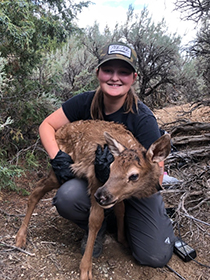
Speaker's Bio
SNR ProfileVideo
Seminar & Discussions Archives
The School of Natural Resources, its faculty and affiliated programs sponsor various seminar and discussion series. Unless otherwise indicated, all are open to the public.